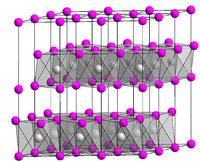Nickel(II) bromide
 | |
| | |
| Names | |
|---|---|
| IUPAC name
Nickel(II) bromide | |
| Other names
Nickel dibromide, Nickel bromide, Nickelous bromide | |
| Identifiers | |
| 13462-88-9 | |
| ECHA InfoCard | 100.033.318 |
| PubChem | 278492 |
| Properties | |
| NiBr2 | |
| Molar mass | 218.53 g/mol |
| Appearance | yellow-brown crystals |
| Odor | odorless |
| Density | 5.098 g/cm3[1] |
| Melting point | 963 °C (1,765 °F; 1,236 K) sublimes |
| 113 g/100ml (0 °C) 122 g/100ml (10 °C) 134 g/100ml (25 °C)[2] 144 g/100ml (40 °C) 155 g/100ml (100 °C) | |
| Solubility | soluble in ethanol |
| Hazards | |
| Main hazards | Irritant, corrosive |
| NFPA 704 | |
| Flash point | Non-flammable |
| Related compounds | |
| Other anions |
nickel(II) fluoride nickel(II) chloride nickel(II) iodide |
| Other cations |
cobalt(II) bromide copper(II) bromide palladium(II) bromide |
| Except where otherwise noted, data are given for materials in their standard state (at 25 °C [77 °F], 100 kPa). | |
| | |
| Infobox references | |
Nickel(II) bromide, a chemical compound with the chemical formula NiBr2, is the nickel salt of hydrobromic acid. It can be made by reacting nickel, nickel(II) oxide, nickel(II) carbonate, or nickel(II) hydroxide with hydrobromic acid. It can also be made by reacting nickel with bromine. It is a weak reducing agent.
It is yellow-brown, rhombohedral, hygroscopic, and is soluble in water and in ethanol. It dissolves in water to make a blue-green solution typical of soluble nickel(II) compounds. It can be used as a source of the bromide ion. It reacts with bases to make nickel(II) hydroxide.
Nickel(II) bromide, like most nickel compounds, is toxic and a suspected carcinogen. It can cause contact dermatitis in skin. The bromide ion is also mildly toxic.
References
- ↑ http://chemdat.merck.de/documents/sds/emd/deu/de/8181/818174.pdf
- ↑ http://chemister.ru/Database/properties-en.php?dbid=1&id=3859
